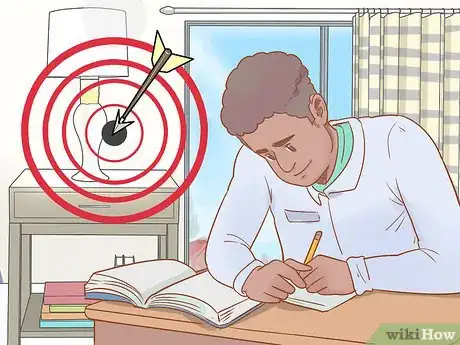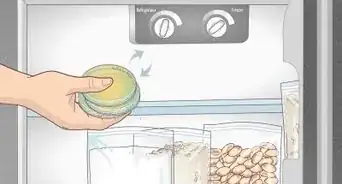This article was co-authored by Ted Coopersmith, MBA. Ted Coopersmith is an Academic Tutor for Manhattan Elite Prep, a test prep and academic tutoring company based in New York City. In addition to general academic advising, Ted has expertise in preparing for the ACT, SAT, SSAT, and ASVAB tests. He also has over 30 years of financial controller advising and consulting experience. He holds a BA from the City University of New York (CUNY) and an MBA from Pace University.
This article has been viewed 18,279 times.
When medical schools receive applications, they will receive a separate science or “BPCM” (Biology, Physics, Chemistry, and Math) GPA.[1] A low science GPA can make an application less competitive. For college students, retaking classes, improving study skills and choosing classes wisely can raise your GPA. If you are close to graduating, completing a Post-Bacc may be the best way to raise your science GPA.
Steps
Boosting Your GPA While Still in College
-
1Sprinkle in some easier science classes. Some science classes, like organic chemistry, are notorious for knocking down GPAs, while others are traditionally more GPA friendly. You need to fulfill pre-med requirements, but sprinkling in courses like Astronomy, Ecology, Entomology, or Zoology (which all count towards BPCM GPAs) can help raise your GPA.[2]
- Medical schools will also look at the difficulty of your classes, and you cannot fulfill your pre-med requirements by taking all easy classes, but it can be a way to provide a small boost.
- Some classes that seem “science-y” do not count towards your BPCM. Classes in this category include psychology, public health, and nutrition.
- The Association of American Medical Colleges has a list of exactly what classes count towards your BPCM.
-
2Spread out notoriously difficult classes. It is not a good idea to take all of your difficult math and science classes in the same quarter. Talk to a counselor about good ways to plan out your 4 years and give yourself the best chance at succeeding in those inevitably tough science classes.Advertisement
-
3Retake classes you did poorly in and aim for a better grade. If you know you are capable of doing better than you did in a class, it may be worth it to retake it. Focus on your study habits the second time around, and know that you are coming in with a bit of an advantage having already seen the material.
- The material will be more familiar, but that won't make it easy. You will still need to apply yourself.
-
4Study with other students and go to office hours. By establishing study groups, you can co-create study guides, talk through concepts, hold each other accountable, and teach each other material. In many math and science courses, practice problems are a great way to get a hang of the material. In office hours, you can receive extra problems or work on existing homework problems.
- Learning how to explain material in your own words can help you to better commit it to memory, so alternate between teaching and learning with friends.
- The ability to explain a concept to others is also a very good indicator of your level of understanding.
-
5Set goals and eliminate distractions to make the most of study time. Set a goal to study for an hour without checking your phone or social media, and if you meet it, reward yourself. Try using apps like Self Control (which block websites like Facebook and Twitter from your computer for a period of time you choose) or putting your phone on do-not-disturb.
- Libraries and other quiet study zones can set a good tone for studying and help you stay on track.
-
6Carve out time to do well in school by managing your extracurriculars. Every student is different, and you might need more hours of studying than a friend to get an ‘A’. Carve out time by evaluating what else you spend your time on. While some outside activities-- like working to pay for college or caring for a family-- are non-negotiable, too many clubs, sports, hobbies or other activities might be distracting you from schoolwork, and you may need to limit them to some extent.
- Keep a detailed calendar. Block out periods of time to study uninterrupted and create routines that work for you.
- Maintain the outside things that make you happy. Finding activities and people that reduce stress and keep you happy can help you feel more focused when you do get back to studying.
-
7Fit exercise into your schedule to improve your focus and energy. Not only does exercise include your mood, energy, and sleep, studies indicate that it can actually change the structure of the brain to improve memory.[3] If you’re struggling to stay active, find friends who will act as accountability buddies, do online workout videos, or try out new activities like dancing, swimming, or pilates.
- If scheduling is an issue, there are many affordable gyms, like the YMCA, that offer fitness classes at all times of the day, opening early in the morning and closing late at night.
- Workout videos online offer flexibility for people who cannot make it to the gym. Set up a space in your home or apartment that you can use to workout and you can do this late at night or first thing in the morning before you start your day.
Completing Post-Baccalaureate Classes
-
1Research Post-Bacc programs to see if they’re a good fit. Post-Baccalaureate programs are 1-2 year post-undergraduate programs for improving a medical school application or fulfilling additional course requirements. Academic-enhancing programs can raise your undergraduate GPA if you excel in them, as your GPA here will be factored into the BPCM. Review the reputation of the Post-Bacc and see how many of their students go on to medical school.[4]
-
2Decide if you’re serious about pursuing a Post-Bacc. While these programs can help make your medical school application more competitive, it is not a guarantee that you will get into medical school. How low your GPA is, how serious you are about pursuing medicine, and whether you think you will be able to excel in your Post-Bacc are all important considerations.
- A very-low GPA (2.5 range, for example) doesn’t mean medical school is impossible, but it will be much harder. At that point, how much you want it and whether you believe you can do better in the Post-Bacc will inform your decision.
- These programs can be expensive (usually around the same as undergraduate education per credit) so look at their loan and financial aid options. [7]
- According to the AAMC, about 15 percent of med-school students have completed some post-baccalaureate work.[8]
-
3Apply to several Post-Bacc programs and decide which is right for you. Even if you have a first choice, applying to several options will allow you to weigh options once you know how much financial aid they are offering. To choose which Post-Bacc program is right for you, you will need to weigh cost and chances of getting into a good medical school, among other things.
- Remember that your goal is ultimately to get into medical school. If one school offers you a better chance at that, it might be worth paying a bit more for that opportunity.
-
4Enroll in the Post-Bacc program of your choice and get to work. Once you begin, apply yourself to your courses with dedication. If you had lower grades in undergrad, you will need to work hard, study well, and focus to get the grades necessary to raise your GPA.
- The Post-Bacc can only raise your GPA if you excel at your classes, so it’s time to work hard and pursue that dream of practicing medicine.
References
- ↑ https://www.kaptest.com/study/mcat/whats-the-average-gpa-for-medical-school-matriculants/
- ↑ https://www.prospectivedoctor.com/overall-bcpm-gpa/
- ↑ https://www.health.harvard.edu/blog/regular-exercise-changes-brain-improve-memory-thinking-skills-201404097110
- ↑ https://studentaffairs.jhu.edu/preprofadvising/pre-medhealth/after-graduation/masters-post-bac-programs/
- ↑ https://www.nytimes.com/2012/04/15/education/edlife/a-second-opinion-the-post-baccalaureate.html
- ↑ https://www.nytimes.com/2012/04/15/education/edlife/a-second-opinion-the-post-baccalaureate.html
- ↑ https://www.nytimes.com/2012/04/15/education/edlife/a-second-opinion-the-post-baccalaureate.html
- ↑ https://www.nytimes.com/2012/04/15/education/edlife/a-second-opinion-the-post-baccalaureate.html
- ↑ https://www.kaptest.com/study/mcat/whats-the-average-gpa-for-medical-school-matriculants/















-Electric-Shock-Step-9.webp)





















































